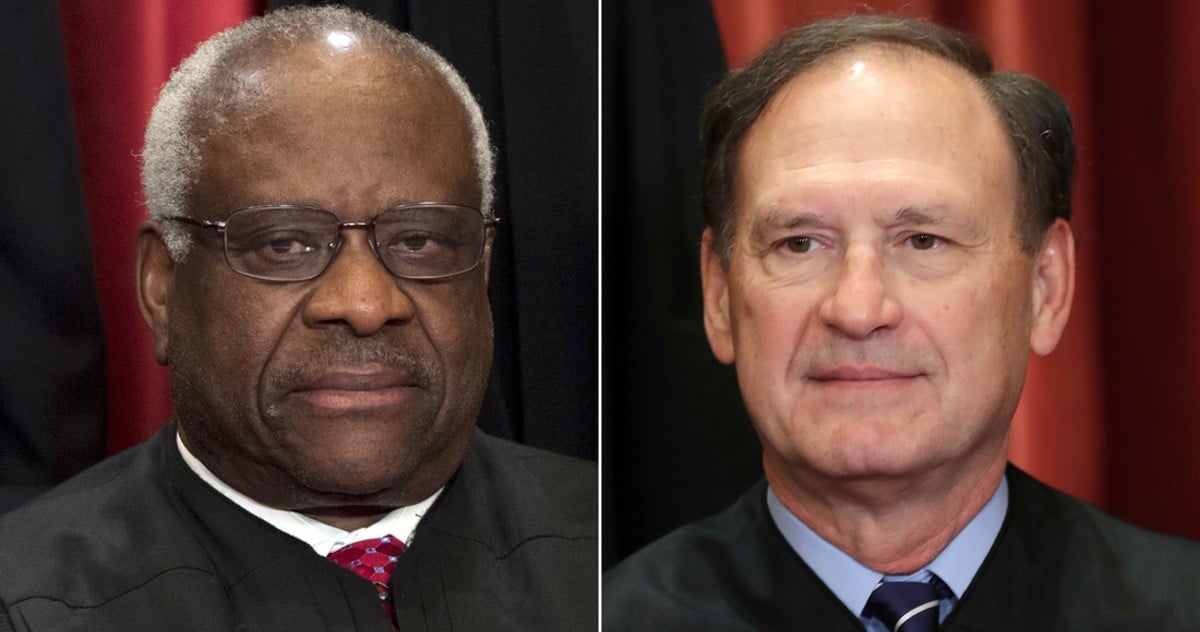OPINION: This article may contain commentary which reflects the author's opinion.
U.S. Supreme Court Justices Clarence Thomas and Samuel Alito are expressing concern over what they suggested are “serious” flaws with a gun control law passed by the Democratic supermajority in New York following a ruling in June against the state’s previous concealed carry rules.
The justices warned that the new law “presents novel and serious questions under both the First and the Second Amendments,” even though the highest court in the country decided not to intervene while lower courts continued to hear arguments for and against it.
Newsmax noted:
The Supreme Court last week issued an order allowing New York to continue enforcing the banning of guns from “sensitive places,” such as schools and playgrounds, while a federal appeals court prepares to hear arguments challenging the law.
Alito and Thomas, two of the Supreme Court’s most conservative members, issued a statement with the order saying the law “presents novel and serious questions under both the First and the Second Amendments.”
“Applicants should not be deterred by today’s order from again seeking relief” if the lower courts do not move quickly to adjudicate the cases against the New York law or explain their actions wrote Alito, who was joined by Thomas.
According to reports, gun rights groups and gun owners sought to have the Supreme Court lift a federal appeal court ruling that temporarily put a hold on a lower court’s ruling blocking portions of the new law.
“Thomas in June authored the high court’s New York State Rifle & Pistol, Inc. v. Bruen decision that struck down a New York law regulating who is allowed to carry a concealed weapon in public. The state then rewrote the law,” Newsmax reported.
“Now, there are four Second Amendment-related challenges to that law at the federal appeals court level. The 2nd Circuit, which holds a 7-6 Democratic-led majority, announced Friday it would hear arguments March 20 against several provisions in New York’s law,” the outlet noted further.
The short, unsigned Supreme Court order issued on Wednesday deferred to the 2nd Circuit after the appeals court blocked a pause on portions of the rewritten New York law in December. The appeals ruling came after a U.S. district court judge struck down most of the law’s provisions in early November, according to the Washington Examiner.
Alito and Thomas wrote that the high court’s order was to “reflect respect for the 2nd Circuit’s procedures in managing its own docket,” adding that the ruling in no way was meant to judge the merits — or lack thereof — regarding the law.
South Texas College of Law Prof. Josh Blackman told the Examiner that the SCOTUS decision not to take the case and defer to the 2nd Circuit instead was not surprising since the June decision is not that old.
“So I think what Alito was saying is, yes, this will take some time to work its way through the system. But the 2nd Circuit should be very mindful that they can’t just sort of ignore [the June ruling]; they have to sort of grapple with its decision,” he said.
He added that lower federal courts many times attempt to read Second Amendment precedents very narrowly, noting he doesn’t believe that “lower courts are going to like [the] Bruen [decision], especially in places like New York and New Jersey.”
“What’s new is that if the 2nd Circuit completely botches Bruen, the Supreme Court may intervene early,” Blackman told the Examiner. “So I think there’s an incentive for the 2nd Circuit to take very carefully what’s in Bruen and not just sort of rely on old precedents.”
New York was among roughly six states whose concealed carry restrictions were found to be in violation of the Second Amendment’s protected right of individuals to keep and bear arms outside of their homes. In the wake of the June ruling overturning the New York law, the state rewrote it and Democratic Gov. Kathy Hochul signed it.
The new law is immediately challenged in court, with plaintiffs citing the Bruen precedent.
“They seem to be designed less towards addressing gun violence and more towards simply preventing people from getting guns — even if those people are law-abiding, upstanding citizens, who according to the Supreme Court have the rights to have them,” Jonathan Corbett, a Brooklyn attorney and concealed carry applicant who challenged the law along with several others, told the AP in August.
